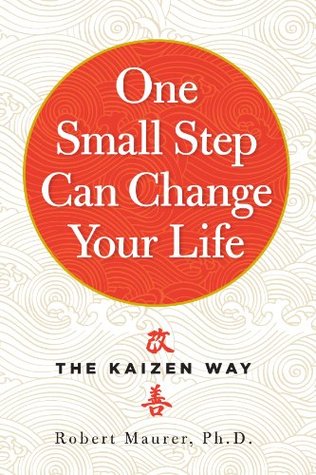More on this book
Community
Kindle Notes & Highlights
Read between
November 25 - November 29, 2020
This book will show you how to harness the power of kaizen: using small steps to accomplish large goals. Kaizen is an ancient philosophy captured in this powerful statement from the Tao Te Ching: “The journey of a thousand miles begins with a single step.”
Kaizen has two definitions: using very small steps to improve a habit, a process, or product using very small moments to inspire new products and inventions
“You can’t live a perfect day without doing something for someone who will never be able to repay you.”
low-key change helps the human mind circumnavigate the fear that blocks success and creativity.
This approach to fear is unproductive. If your expectation is that a well-run life should always be orderly, you are setting yourself up for panic and defeat. If you assume that a new job or relationship or health goal is supposed to be easy, you will feel angry and confused when fear arises—and you’ll do anything to make it disappear.
When life gets scary and difficult, we tend to look for solutions in places where it is easy or at least familiar to do so, and not in the dark, uncomfortable places where real solutions might lie.
Again and again, I’ve seen dramatically different effects between asking questions and issuing commands—and
Perry Spencer didn’t sit around the house, drumming his fingers and pounding his forehead, thinking, “How, how, how can I invent a device that will revolutionize kitchens around the world?” Spencer, an engineer at Raytheon, was at work one day when he left a candy bar too close to some radar equipment. The snack melted, and he asked himself, “Why would radar have this effect on food?” This small question led to answers that led to other small questions whose answers eventually changed how you and I make dinner.
If you are unhappy but aren’t sure why, try asking yourself this: If I were guaranteed not to fail, what would I be doing differently? The question’s whimsical quality makes it safe for the brain to answer truthfully, and it can produce some surprising answers that lend clarity to your goals.
If you are trying to reach a specific goal, ask yourself every day: What is one small step I could take toward reaching my goal?
What is one small step I could take to improve my health (or relationships, or career, or any other area)? This question is designed to remain open, to give the brain plenty of room for play. Be prepared for surprising answers!
If you tend to feel pessimistic or negative, try asking yourself this question: What is one small thing that is special about me (or my spouse, or my organization)? If you continue to ask yourself this question over time, you’ll program your brain to look for what’s good and right, and you may eventually decide to capitalize on these shining aspects, perhaps with a new marketing campaign at work or ideas for family activities at home.
Mind sculpture, developed by Ian Robertson, is a newer technique that involves total but still-imaginary sensory immersion. It requires its practitioners to pretend that they are actually engaged in the action, not just seeing but hearing, tasting, smelling, and touching. In mind sculpture, people imagine the movement of their muscles, and the rise and fall of their emotions.


